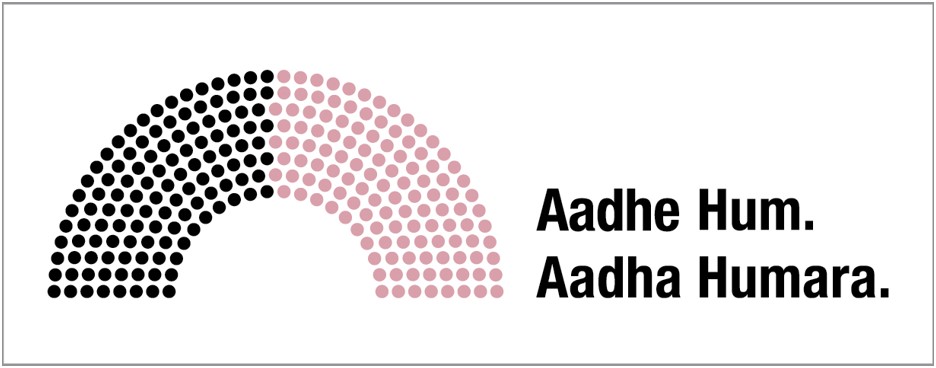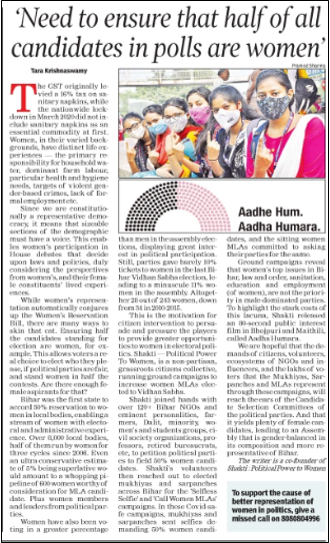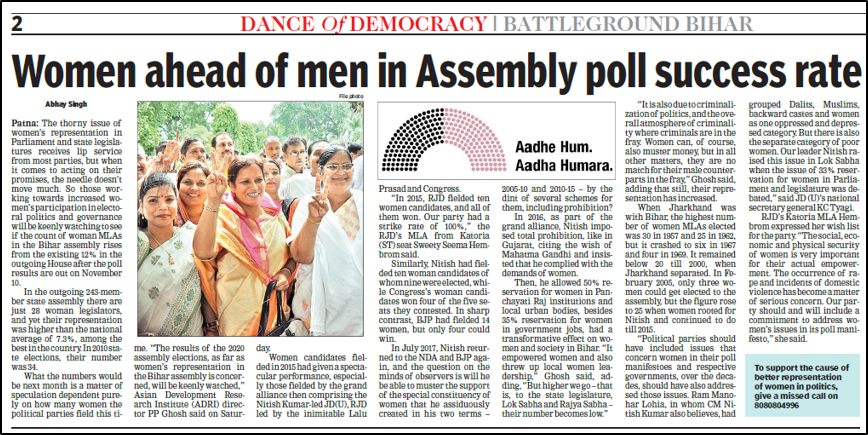Aadhe Hum, Aadha Humara
About the initiative
Women comprise almost half the population of the country but hold only 14.4% of Lok Sabha seats and even worse at the state level with only 9% of Vidhan Sabha seats. If women are represented in critical mass in the State Assemblies, not only issues pertaining to women would receive attention but their lived experiences would enrich and balance overall law and policy-making in the state.
Can our country be truly democratic and inclusive if women do not get as many seats as men in Parliament where the destiny of our nation is carved and re-carved? TOI asked this burning question to every citizen in Bihar, launching Aadhe Hum, Aadha Humara to talk about women’s inherent right to have half the seats. For every 10 men, there is less than 1 woman in our Vidhan sabhas. Women face multiple issues across the country related to law and order, water, health, employment, etc. If they are not represented well in parliament, how will their issues get addressed?
Bihar elections were India’s first mass poll after the COVID-19 pandemic struck the country. More than seventy million of its men and women voted to elect a new government amid a raging battle against COVID-19. Saluting this great tradition of citizens forming a Government of their own choice through ballots, The Times of India began a campaign to raise awareness and sensitize voters of Bihar about how women can get full justice in our democratic system.
TOI’s campaign ‘Aadhe Hum, Aadha Humara’ included a detailed editorial report on success rate of women vs men in Assembly polls, a digital public interest film, and series of ads in TOI. This initiative was supported not only in print, but Change.org, radio, social media, TOI digital platform to ensure wider and maximum possible reach. Women leaders from three major political parties in Bihar (BJP, JDU and RJD), two civil society groups (a social activist from Oxfam India, a Padmashree awardee from Nari Gunjan) and from Shakti, a pan India, non-partisan citizens pressure group working to get more women in state assemblies & parliament spoke out in unison in support for a better representation of women in politics.
In order to make it impossible for politicians to turn a blind eye, towards the able and available women leaders at grassroots, level - Shakti partnered with TOI to create a movement called - The Nominate-Me Selfie. Teaming up with NGO’s at grassroots levels, the word was spread and it urged women leaders to send their Selfie-CV’s to their local leader in parliament, asking to be nominated. Screens, newspapers, and public consciousness became flooded with the faces of women leaders, and their significant development achievements, igniting a grassroots women’s movement. Young Bihari women started tagging their leaders demanding more candidates in the state elections. As hundreds of selfies started to pour in it caught the media’s attention, which led by TOI amplified a state phenomenon into a national issue.
TOI also released an 80-second public interest film in the local dialect (Bhojpuri and Maithili) to reach out to the masses which created a huge buzz and went viral within days in Bihar.
Women have been voting in a greater percentage than men in assembly elections displaying, greater interest in political participation. Still, party gave barely 10% tickets to women in the last Bihar vidhan sabha election, leading to a miniscule 11% women in the assembly. The campaign realized it’s success when Janta Dal United party fielded 22 women candidates (~20% of woman candidates) in Bihar Assembly Election 2020. This is the highest number of woman candidates fielded by any political party in the Bihar Assembly Elections.
This is the motivation for citizen intervention to persuade and pressure the players to provide greater opportunities to women in politics.





